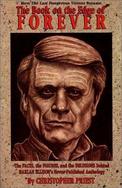Reading things like this, or more to the point knowing that they exist to read, is going to make it look like I'm more a part of SF fandom than I am. Or at least think I am. I plead innocent; I saw it mentioned in a David Langford interview of Christopher Priest and was curious.
Harlan Ellison is a rather famous (or notorious) figure in science fiction for several reasons. Recently, he's been heard from more in the area of media SF and in his war against ebook piracy and his lawsuit against AOL, but historically, he's best known for quite a bit of very influential writing, mostly short stories, mostly in the 1960s and 1970s, that many people love and that I found nearly unreadable. (I keep meaning to give them another shot.) He's also well-known as the editor of an anthology titled Dangerous Visions, which focused on publishing things that might have been too edgy to publish in other markets, brought to US recognition the largely British New Wave movement in SF, and had a significant impact on the way SF was written and published. Dangerous Visions got a fair bit of critical acclaim outside of just the SF community, was later used in university courses, and is one of the best-known anthologies in the history of SF.
Harlan Ellison is also famous for having a vicious temper.
A few years after Dangerous Visions came a follow-on anthology, Again, Dangerous Visions, and immediately after it there was a plan for a final anthology entitled The Last Dangerous Visions. This is where the trouble starts, and where this pamphlet comes in. See, after having first been announced in 1971, and after decades of statements by Harlan Ellison that it's going to be published any day (and decades of the stories submitted for it being held in limbo), The Last Dangerous Visions still has not actually materialized.
This is more a pamphlet than a book, and while trying to be strong on objective detail, it's more a rant than a historical essay. It was originally written by Christopher Priest in his fanzine, achieved a great deal of polarized attention, and was finally published by Fantagraphics in large part because Gary Groth (the co-founder of Fantagraphics) has a famous public feud with Harlan Ellison. In other words, this is an exercise in airing some dirty laundry in public. If you enjoy that sort of thing (and heaven knows, it's the main reason why I read occasional fannish bits, since if one isn't involved it can be highly entertaining), this is a pretty good one. If you don't, don't bother.
Priest chronicles, in detail, all of the broken promises, emotional manipulation, anger, and uncontrolled growth of The Last Dangerous Visions as an anthology and a concept. It became, in Ellison's intention, a collection of all of the other major names in SF, and at this point has almost certainly ballooned out of control to the point where it's completely unpublishable. It's also clearly something in which Ellison has invested too much to be able to easily back down. The details are amusing from the train wreck perspective, but it's also rather fascinating to see just what can go wrong with a successful anthology and how a project like this can turn into something that is simply too large to be finished. It also gives, mostly as a side effect, some interesting insight into the politics and contractual agreements that go into publishing a short story anthology.
Priest's core point is that the project will never actually happen, Ellison needs to come to terms with that fact and return all of the stories, and it's a crying shame that all of that work has been held in limbo all these years with Ellison hanging on to first publication rights for a work that will never be published. It's unclear at this point how much it really matters any more — many of those stories are going to be rather dated at this point and inferior to more recent work by the same authors — but I found the argument entertaining.
Incidentally, reading the Amazon reviews for this pamphlet is a riot. Ellison is a polarizing character, with a set of avid, defensive fans and a set of angry enemies, and seeing them fight it out on Amazon is good for a few minutes of amusement. I particularly liked the accusation that Priest is just jealous, trying to build his career on the back of a better author, and furthermore is trying to cash in on having the same name as the famous comics writer. A brief web search would have revealed that Priest has been writing SF since the 1960s, has four BSFA awards, a World Fantasy award, and an Arthur C. Clarke award, and was rather non-plussed when the comics writer changed his name to match.
Reviewed: 2005-03-28
